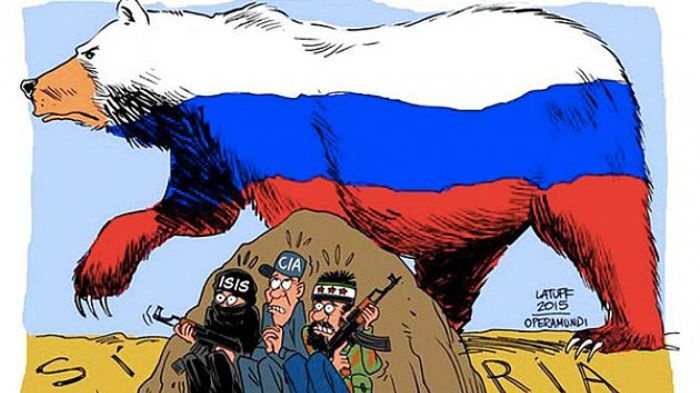Switching to a New Language: Russia and military operations in Syria

By: Mohammad-Mehdi Mazaheri
During the last week, Russia has carried out extensive military operations in battle against ISIS and other extremist groups. Security and military officials have reinforced their cooperation with Syrians and targeted ISIS positions in the Syrian territory. They have also announced that they are ready to attack ISIS targets in Iraq upon the request of its government.
Western states have expressed concern against Russia's military actions. Along with Syrian opposition, they have claimed that Moscow is targeting groups other than ISIS. Russian jets have in the meantime violated Turkey's airspace, a move that raised the objection of Ankara officials and their NATO allies. However, it seems that such objections mainly stem from Western countries' fear that Russia's active role in the Middle East could reveal their strategic weakness and lack of determination to fight ISIS.
Russia violation of Turkey's airspace does not seem to be incidental, but rather premeditated. Turkey is a key trade partner of Russia, and a main receiver of its natural gas exports. However, Moscow has proved time and again (and we Iranian have experienced that tangibly) that when it comes to serving national interests, it makes no exceptions. Moscow may also want to punish Ankara for its equivocal stance against ISIS, and its hostility towards Assad's government.
On the other hand, it seems that Russians' attack on ISIS and violation of Turkey's airspace betrays a message for NATO. For years, Kremlin has insisted that with disintegration of the Soviet Union and annulment of the Warsaw Pact, there is no justification for NATO's existence, let alone its encroachment towards east. However, NATO has highlighted the threat of Islamism and fundamentalism for international community to justify its expansion. And the 9/11 incident brought for it a stronger role in defense and military affairs. The 2004 Istanbul Summit directly pointed to the situation in the Middle East and called for the alliance's stronger presence in this region. With ten former members of the East Bloc joining NATO and southern Caucasus countries reinforcing their cooperation with the club, Russia felt the noose becoming tighter. Moscow had adopted a reconciliatory tone towards NATO throughout the recent years, yet the Ukraine crisis proved that this is not fruitful approach.
The Syrian war is an opportunity for Russia to prove to its archenemies that NATO has failed to fulfill its mission of fighting against terrorism and fundamentalist Islam, if that was ever a real cause; and Moscow aims to follow their unfinished business. It may also aim to demonstrate that increasing influence in the Middle East and Eastern Europe will not be tolerated at any rate. Violating the airspace of other countries is against the international law, but perhaps Kremlin has decided to opt for the more effective language of power.
* This piece was originally published in Iranian Diplomacy Persian. Mohammad-Mehdi Mazaheri is a university lecturer and expert in Middle East affairs.

